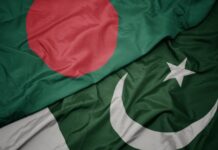Days after making a deal with the banned Islamist extremist group, the Tehreek-e-Labbaik Pakistan (TLP), the Pakistani government has announced that it has made another peace deal with another banned Islamist terror group – the Tehreek-e-Taliban Pakistan (TTP).
It is being reported that the Pakistani military has been behind these peace deals, as it wants to use such Islamists for its own purposes.
The first peace deal the government made a few weeks ago was with the TLP which became prominent in the aftermath of anti-government protest in 2017 in support of blapshemy laws. Later, the country’s top courts investigated and questioned the role of the Pakistani military in orchestrating these protests to undermine the then civilian government, which had a troubled relation with the Pakistan army and the then Prime Minister Nawaz Sharif, who was ousted by the country’s generals in 1999.
The second and the most recent peace deal that the government has made is with the TTP which came into existence in 2007 after failure of successive peace deals with the then military government of General Pervez Musharraf, who ruled Pakistan from 1999 to 2008. Since its inception 14 years ago, the terrorist group has unleashed a campaign of bloodshed and violence, killing thousands of Pakistani civilians, and soldiers. In 2014, the TTP carried out its deadliest attack in a school in Peshawar city killing 150 people, a majority of which were children, resulting in Pakistan Army to finally launch a full-fledge operation against the group. But it soon emerged that the military had allowed most of the militants to escape across the border in Afghanistan, and now with the acscension of the Afghan Taliban in power there, it is being reported pushed the Pakistani Taliban to make a peace deal with the Pakistani government.
At the same time other banned extremist groups are also demanding Pakistani state to unban them. For example, the banned anti-Shia political party known as Sipah e Sahaba (SSP) originally and which goes by the name of Ahl e Sunnat Wal Jamaat (ASWJ) today, is demanding that the government unban them. The party is responsible for violence against the Shia sect across Pakistan.
Such appeasement of and deal-making with Islamist groups has been a hallmark of the Pakistani state, and in past such peace deals have always failed, resulting in the terrorists coming out stronger on the other side, with the state’s writ weakening further. But Pakistan seems not to learn a lesson. Or is this what the Pakistani state want? To continue to be a terror factory because such groups serve the strategic purposes of the Pakistani military, that runs the country from behind the shadows.
The Pakistani military has been accused for pushing Islamist militant groups and ideology across its borders to disrupt peace in Afghanistan and Kashmir for several years now. And it has also been accused of using such militants at home to counter ethno-nationalist sentiments among the Baloch and the Pashtuns by Islamizing the population at large.
Alarmingly, Pakistan is making such peace deals with terrorists at a time when it is on a review with the international financial watchdog – the Financial Action Task Force (FATF) in failing to stop terror-financing and money-laundering, and has remained on its grey-list for the last three years. Also most of such deals are being done behind closed doors with the country’s military’s involvement while the civilian leadership is being kept out of these vital negotiations, raising serious concerns of transparency and accountability.
